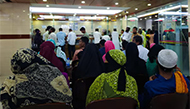▶ Allen An / Northwood HW 12th Grade
.jpg)
Allen An / Northwood HW 12th Grade
Turbulence is the appearance of tiny tornadoes that something creates when it moves through a liquid or gas. (These tiny tornadoes mix with each other in ways that are very difficult to predict. Figuring out how to deal with this is one of the biggest challenges in physics and engineering. In fact, physicist Richard Feynman, one of the greatest physicists in world history, called turbulence “the most important unsolved problem in classical physics.” So, who out there is stepping up to try to solve the problem of turbulence? Well for one, aerospace engineer Stephen Hu is.Hu was born in Madison, Wisconsin, where his parents settled down after immigrating to America from Taiwan. Ever since he was little, Hu was a huge fan of the Star Wars movies, especially the giant battles with hundreds of vehicles shooting lasers in all directions. The aircraft and spacecraft in the series especially intrigued Hu. He soon started to notice he was fascinated by all kinds of flying things: spaceships, fighter jets, and birds. Once he was about thirteen or fourteen, Hu realized he wasn’t satisfied with just watching these crazy futuristic vehicles in movies. He wanted to figure out how they actually work and recreate them himself.
After high school, Hu attended the University of Minnesota to study Aerospace Engineering and Mechanics. When given the choice to choose an area of focus within his major, Hu chose fluid dynamics. He enjoyed it so much that after he graduated, he stayed two more years to get a Master’s in Aerospace.
Stephen is currently working for a company that designs the testing facilities for jet engines. Nowadays jet engines need to be more quiet and efficient than ever which means they will be getting bigger. As part of a research and development team, it is his job to improve simulation accuracy and efficiency as well as studying turbulence.
Hu’s words of wisdom include being proactive and seeking others with similar passions. Hu advices that there are tons of information available online and should be utilized as a resource? it’s never too late to get ready for college. Who knows? By following Stephen’s advice and putting in some hard work, you could soon be solving one of the greatest mysteries in physics.
Or, you can figure out how to build a space cannon to launch stuff into space.
Stephen has advice for you: The #1 Rule: BE PROACTIVE!
● Seek out other people with similar passions or create your own clubs/groups.
● Get ahead: There is tons of information online, you can even get a head start on your college education using sites like the MIT Open-courseware or edx.
● Learn a new skill: There are even free programs for you to play around with like Open foam(similar to what Stephen uses at work). A large community supports this and they are willing to help beginners.
● Don’t be afraid to go directly to a college professor near you and ask if you could help or volunteer for a research project.
● Read articles like the ones mentioned above and ask teachers or find a mentor to help you figure out what you need to work on to get into those types of fields (sending well written emails works well!).
Who knows? By following Stephen’s advice and putting in some hard work, you could soon be solving one of the greatest mysteries in physics.
Or, you can figure out how to build a space cannon to launch stuff into space.
스마터리빙
more [ 건강]
[ 건강]이제 혈관 건강도 챙기자!
[현대해운]우리 눈에 보이지 않기 때문에 혈관 건강을 챙기는 것은 결코 쉽지 않은데요. 여러분은 혈관 건강을 유지하기 위해 어떤 노력을 하시나요?
 [ 건강]
[ 건강]내 몸이 건강해지는 과일궁합
 [ 라이프]
[ 라이프]벌레야 물럿거라! 천연 해충제 만들기
 [ 건강]
[ 건강]혈압 낮추는데 좋은 식품
[현대해운]혈관 건강은 주로 노화가 진행되면서 지켜야 할 문제라고 인식되어 왔습니다. 최근 생활 패턴과 식생활의 변화로 혈관의 노화 진행이 빨라지고
사람·사람들
more많이 본 기사
- 백악관 “미네소타 이어 他민주당 州들도 정부지원금 사기 조사”
- 오픈AI 직원, 올해 평균 150만 달러치 주식 받아…역대 빅테크 최고
- 트럼프, 집권2기 첫 법안 거부권… ‘보복성’ 권한 행사 논란
- 낸시랭, 사채 빚 15억 떠안았다..오열 고백 “좀비떼처럼 뜯어 먹어”
- “美서 학생 백신 접종률 급감”… ‘백신의 정치화’ 여파
- ■ 제언 / 한인회 사태 신속한 해결을
- 제야의 종으로 ‘붉은 말의 해’ 시작… “행복 오는 2026년 되길”
- 말리·부르키나파소 “미국인 오지마”…美입국 금지에 맞불
- “메타, 사기광고 규제 피하려 검색결과 조작…대응지침도 마련”
- ‘상간녀 의혹’ 숙행, 리액션만 간신히 건졌다..무대는 통편집
- 조세호 ‘조폭 연루설’ 털고 빠른 복귀 수순.. ‘도라이버’ 시즌4 합류
- “추신수는 지울 수 없는 발자취 남겼다” 美 야구기자, 명예의 전당 투표서 ‘CHOO 선택’ 이유 밝혔다
- ‘억’ 소리 나는 ‘개념 부부’..신민아♥김우빈·손예진♥현빈
- ‘첫 무슬림 뉴욕시장’ 맘다니, 취임식때 쿠란에 손 얹고 선서
- 폭설 속 산행 비극… 마운트 볼디서 3명 조난 사망
- 숙명여대 뉴저지 동문회 송년회
- “10년간 모든 이민 전면 금지?” 황당 주장
- LA 북쪽 테혼 카지노서 하룻새 10만불 ‘연속 잭팟’
- 시애틀 다운타운 상권 명암 엇갈려...의류할인점 ‘로스’ 폐점, 노스트랙 이전
- 4명 군 입대했지만..세븐틴, 13人 완전체 회식 현장 포착
- 원·달러 환율… 연평균 기준 ‘역대최고’ 마감
- 한국팀 뛸 곳인데… 강력범죄 ‘충격’
- ‘최하 평점+부상 교체’ 황희찬 대위기, 울버햄튼 무려 ‘19경기 무승+압도적 꼴찌’... 강등권 탈출 ‘빨간불’
- [연말 기획] 한국계 혼혈들 두각… 각 분야에서 ‘맹활약’
- ‘백두산 호랑이’ 대가족 포착… “매우 희귀한 일”
- 지방세 공제한도 1만→4만달러로 상향
- 알고보니 ‘완전식품’인 고구마의 놀라운 효능
- “치매에 치즈가 좋대서 맨날 먹었는데”… 고지방 주의
- 코스트코행 40만달러 랍스터 도난당해...‘스푸핑, 위장트럭’까지…워싱턴주 등 미 화물절도 극성
- ‘헤비급 복서’ 조슈아 구사일생 동승자 2명 사망사고에도 경상
- [한인 은행장 신년사 통해 본 비전과 경영 목표] “끊임없는 변화와 혁신으로 안정적 성장 도모”
- 안성기, 1월 1일 생일 하루 앞두고 심정지 상태 병원 이송..쏟아지는 응원
- 샴페인, 마지막 날과 첫날을 위하여
- 가주 판매 간 소고기 ‘이콜라이’ 오염
- 불체자 의심 메디케이드 정보 공유 허용
- ‘케네디’가 또 비극 외손녀 희귀암 별세
- 신년 연휴 폭풍우… 비 3인치 온다
- “라면, 못 끊겠다면 ‘이거’라도 넣어라”
- 22개주서 생굴 먹고 살모넬라균 감염
- [연말 화제] 올해도 찾아온 ‘얼굴 없는 천사’
- [인터뷰-문경환 한인회장] “캔자스, 이민자들에 제2의 기회의 땅”
- 브라이언트팍서 외국인 관광객 묻지마 칼부림
- 한동훈 “가족이 尹부부 비판 글 올린… 2
- 이명석 회장, “공금횡령^불법행위 한적 없다“
- NYPD 무력 사용 역대급 증가
- [조지 F. 윌 칼럼] 저무는 2025년에 안도의 한숨
- 장수성인데이케어, 송년 파티
- ‘故장제원 아들’ 노엘 “구치소서 5… 1
- ‘아듀~ 2025!’… 희망찬 새해로
- 구리선 절도범 소행에 LA 교통 통신망 ‘먹통’
1/5지식톡

-
 미 육군 사관학교 West Poin…
0
미 육군 사관학교 West Poin…
0https://youtu.be/SxD8cEhNV6Q연락처:wpkapca@gmail.comJohn Choi: 714-716-6414West Point 합격증을 받으셨나요?미 육군사관학교 West Point 학부모 모…
-
 ☝️해외에서도 가능한 한국어 선생님…
0
☝️해외에서도 가능한 한국어 선생님…
0이 영상 하나면 충분합니다!♥️상담신청문의♥️☝️ 문의 폭주로 '선착순 상담'만 진행합니다.☎️ : 02-6213-9094✨카카오톡ID : @GOODEDU77 (@골뱅이 꼭 붙여주셔야합니다…
-
 테슬라 자동차 시트커버 장착
0
테슬라 자동차 시트커버 장착
0테슬라 시트커버, 사놓고 아직 못 씌우셨죠?장착이 생각보다 쉽지 않습니다.20년 경력 전문가에게 맡기세요 — 깔끔하고 딱 맞게 장착해드립니다!장착비용:앞좌석: $40뒷좌석: $60앞·뒷좌석 …
-
 식당용 부탄가스
0
식당용 부탄가스
0식당용 부탄가스 홀세일 합니다 로스앤젤레스 다운타운 픽업 가능 안녕 하세요?강아지 & 고양이 모든 애완동물 / 반려동물 식품 & 모든 애완동물/반려동물 관련 제품들 전문적으로 홀세일/취급하는 회사 입니다 100% …
-
 ACSL 국제 컴퓨터 과학 대회, …
0
ACSL 국제 컴퓨터 과학 대회, …
0웹사이트 : www.eduspot.co.kr 카카오톡 상담하기 : https://pf.kakao.com/_BEQWxb블로그 : https://blog.naver.com/eduspotmain안녕하세요, 에듀스팟입니다…
케이타운 1번가
오피니언
 정숙희 논설위원
정숙희 논설위원샴페인, 마지막 날과 첫날을 위하여
 조지 F·윌 워싱턴포스트 칼럼니스트
조지 F·윌 워싱턴포스트 칼럼니스트 [조지 F. 윌 칼럼] 저무는 2025년에 안도의 한숨
 김동찬 시민참여센터 대표
김동찬 시민참여센터 대표 [미국은 지금] 책임 있는 자본 없으면 커뮤니티 미래도 없다
 성영라 수필가 미주문협 부이사장
성영라 수필가 미주문협 부이사장 [수요 에세이] 다시, 제자리로 돌아와서
 신경립 / 서울경제 논설위원
신경립 / 서울경제 논설위원 [만화경] 경영자의 ‘문제적’ 사과
 문태기 OC지국장
문태기 OC지국장 한인 정치력 업그레이드 기대
 민경훈 논설위원
민경훈 논설위원세계 역사를 바꾼 동물
 박홍용 경제부 차장
박홍용 경제부 차장 한인사회가 주목해야 할 새해 경제
 박영실 시인·수필가
박영실 시인·수필가 [화요칼럼] 피드백
1/3지사별 뉴스

지방세 공제한도 1만→4만달러로 상향
2026년 새해에도 뉴욕과 뉴저지 한인들의 일상에 크고 작은 영향을 미치는 다양한 규정과 법규가 새롭게 바뀌게 된다. 당장 1일부터 뉴욕시 최…
■ 사고- 한동대·뉴욕한인청소년센터 국제여름캠프

2025 워싱턴지역 10대 뉴스
다사다난했던 2025년이 하루만 남겨둔 채 역사의 저편으로 저물고 있다. 올해의 가장 큰 뉴스는 트럼프 2기 행정부 출범과 함께 몰아친 이민 …
내년 1월부터 달라지는 MD 법안들

셀폰 위치추적, 납치된 딸 살렸다… ‘부모 통제’ 기능 활용
스마트폰에서 자녀의 위치를 확인할 수 있는 ‘부모 통제(parent control)’ 위치 추적 기능의 도움으로 납치됐던 청소년들이 잇달아 구…
[새해부터 이렇게 달라진다] 최저임금 또 오르고… 유급 병가는 더 확대

오늘 하루 이 창 열지 않음 닫기 




















































.png)


댓글 안에 당신의 성숙함도 담아 주세요.
'오늘의 한마디'는 기사에 대하여 자신의 생각을 말하고 남의 생각을 들으며 서로 다양한 의견을 나누는 공간입니다. 그러나 간혹 불건전한 내용을 올리시는 분들이 계셔서 건전한 인터넷문화 정착을 위해 아래와 같은 운영원칙을 적용합니다.
자체 모니터링을 통해 아래에 해당하는 내용이 포함된 댓글이 발견되면 예고없이 삭제 조치를 하겠습니다.
불건전한 댓글을 올리거나, 이름에 비속어 및 상대방의 불쾌감을 주는 단어를 사용, 유명인 또는 특정 일반인을 사칭하는 경우 이용에 대한 차단 제재를 받을 수 있습니다. 차단될 경우, 일주일간 댓글을 달수 없게 됩니다.
명예훼손, 개인정보 유출, 욕설 등 법률에 위반되는 댓글은 관계 법령에 의거 민형사상 처벌을 받을 수 있으니 이용에 주의를 부탁드립니다.
Close
x